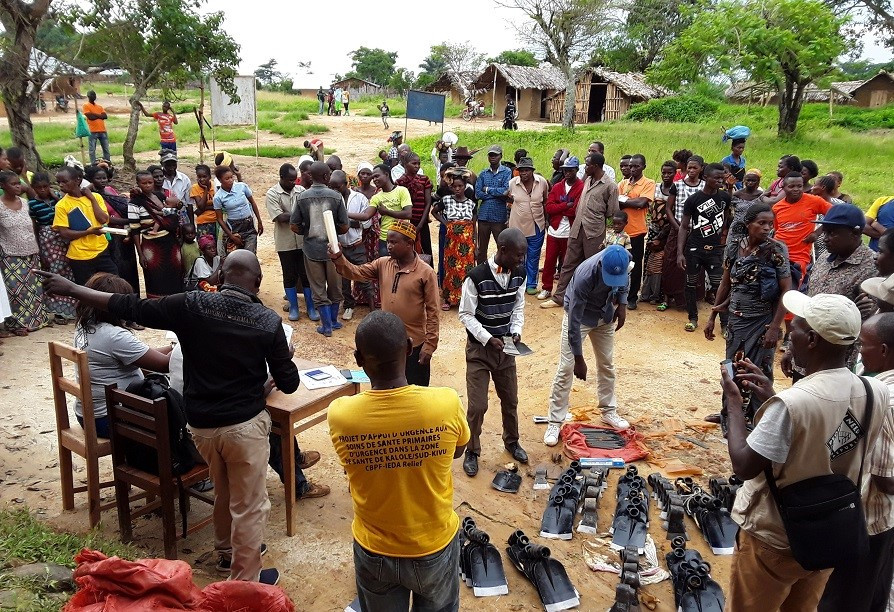“New techniques will allow me to produce much more food for my children,” says farmer Julienne
Published: Feb 3, 2020 Reading time: 5 minutes Share: Share an articleIn January 2019, People in Need (PIN) started activities in an emergency food security project in the Kalole Health Zone, located in the Shabunda territory of South Kivu province, in the Democratic Republic of the Congo (DRC). Malnutrition is a dire issue in Shabunda, thus the aim of the project was to provide agricultural training and tools for the local population in six emergency health areas throughout the zone.

In total, 689 households, or approximately 4,820 people, received aid through the project. “In each health area a targeting committee was established. The members of these committees were identified by local community leaders. Each committee was made up of two members per village, ideally one man and one woman,” says Veronika Stastna, PIN’s Head of Programs in the DRC.
The beneficiaries were selected based on a variety of criteria. “Together with PIN’s team, the committees identified vulnerability and feasibility criteria, such as: households with severely malnourished children or pregnant and lactating women; households with at least three children under five years old; child-headed households; households with abandoned female victim of sexual violence; households with elderly, handicapped, or chronically ill members; households with children living alone; and households with at least one member who has the physical ability to farm,” explains Stastna.
One beneficiary, Julienne Rachid, is a widowed mother of five. “My three-year-old son is extremely malnourished,” says the 32-year-old woman. “I wanted to join the training to learn how to best cultivate my land and to receive the tools necessary to do so.” Another beneficiary explained that she and her husband rely on their work in the field to provide food and send their children to school. “The tools I had were quite old-fashioned, so I am very grateful for the materials given to us by PIN,” she adds.
Demonstration Plots of Land
After participating in the initial agricultural training, each beneficiary received a hoe, an axe, and a file in order to work on their individual fields, as well as on their demonstration plot. The demonstration plot was an area of land where the beneficiaries could teach others what they had learned; for instance, how to sow a variety of seeds on the same plot.
“I was used to cultivating the same sorts of seeds over and over again. However, after the demonstrations, I learned that it was possible to farm multiple types of seeds on one field. I can sow separate lines of beans, peanuts, and corn, all on the same land. This new technique will allow me to use many more kinds of seeds and produce much more food for my children,” Rachid explains.
Food Insecurity
The Food and Agriculture Organization of the United Nations (FAO) defines food insecurity as “a situation that exists when people lack secure access to sufficient amounts of safe and nutritious food for normal growth and development and an active and healthy life.” Food insecurity can arise as the result of food scarcity, insufficient purchasing power, inadequate food distribution, or the mismanagement of food in individual households.
The Shabunda territory is completely landlocked and lacks functional infrastructure (e.g. markets, roads, power supplies), contributing to the food insecurity in this area. Additionally, armed military groups have been active in Shabunda for over 20 years and have caused massive displacement of the local population. PIN is able to support the most vulnerable people in this area thanks to the funding of the DRC Humanitarian Fund, administered by the UN Office for the Coordination of Humanitarian Affairs (OCHA) in DRC.
“I will look after these [agricultural] tools long after this project ends and as I continue to work on my field at home,” concludes Rachid.
30,000 people have lost access to health care due to violence
The humanitarian situation in the DRC remains precarious, with over 15.9 million people, mainly in eastern and central DRC, in need of humanitarian assistance in 2020.
The Kalole Health Zone in Shabunda has been the scene of numerous acts of violence and population displacement. The last clashes there took place in February 2018. According to OCHA, the latest round of violence caused more than 4,300 students to lose access to education due to school closures, while 30,000 people were deprived of access to health care due to the closure of health facilities.
This violence aggravates an already challenging situation. The entire area is almost completely devoid of infrastructure, and people rely entirely on what they can produce themselves. Supplies of food and equipment that are not produced locally are not only far from certain, but also expensive. Although the soil is relatively fertile, most agriculture, which is the livelihood of the majority of the population, lacks nutritional diversity.
A dearth of water infrastructure also forces most of the population to resort to unsafe water for their basic needs, while a lack of sanitation facilities, inadequate hygiene practices, and poor knowledge about health and disease prevention continue to make the population vulnerable to health issues. The result is a high prevalence of a number of diseases – including malaria, acute respiratory infections, waterborne illnesses, and malnutrition. Chronic poverty, displacement, and violence expose the population to extremely high levels of risk to personal safety, particularly with regard to sexual violence; South Kivu ranks second (after North Kivu) in terms of gender-based violence in the DRC.
People in Need in the DRC
PIN has been active in the DRC for a decade. In our current work, we combine malnutrition treatment programs with prevention, and we focus on interrelated issues such as health, water, and hygiene. Moreover, PIN supports agriculture and other activities contributing to the availability of quality and nutrient-dense food. PIN focuses on the most vulnerable population groups, specifically on internal refugees escaping local conflicts, as well as the host families that assist these refugees in remote areas.
